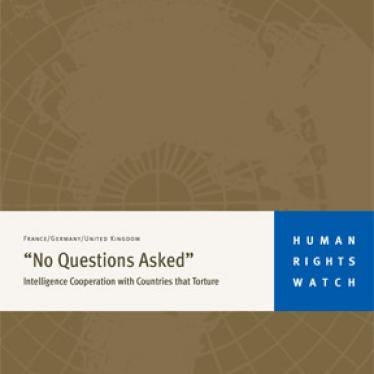Torture is prohibited under international law, at anytime and anywhere. No exceptions are allowed. Yet the UK, France and Germany are engaged in ongoing counterterrorism cooperation with foreign intelligence services in countries that routinely use torture.
These European governments use foreign torture information for intelligence and policing purposes. And the rules in each country meant to keep torture evidence out of the courts - including foreign torture evidence - don't work because the burden falls on defendants to prove the information was obtained under torture, a nearly impossible task.
In Human Rights Watch's new report, No Questions Asked: Intelligence Cooperation with Countries that Torture, we argue that uncritical use of foreign torture information violates the duty of all countries under international law to prevent and eradicate torture worldwide.
French, German and UK intelligence services say they cannot always know the sources and methods used to obtain information abroad.
But intelligence officers should be under clear instructions to make the necessary inquiries - ask the hard questions - to ensure that European services are not using foreign torture information. To do otherwise implicitly validates the use of unlawful methods.
The previous UK government repeatedly asserted that it would use foreign torture information if necessary to prevent terrorism.
Public statements that rationalize the use of torture information send a message to authorities in countries like Pakistan or Uzbekistan - notorious for torture and ill-treatment - as well as to the UK public that torture may be acceptable in the name of countering terrorism. This undermines the absolute prohibition on torture in the most fundamental way.
The new coalition government has the opportunity to correct the mistakes of the past. The announced inquiry into UK complicity in torture of detainees abroad and the stated commitment to publish guidance for intelligence officers are two good steps in the right direction.
To live up to its obligations under international law, the UK government needs to ensure that the guidance require intelligence services to make genuine inquiries of sending countries to determine whether torture was used to obtain information, and what steps the authorities have taken to hold to account those responsible for that abuse.
Parliamentary oversight of intelligence services should be strengthened. And the UK government should publicly and firmly repudiate the use of foreign torture intelligence.
France, Germany and the UK can engage in necessary intelligence cooperation while also upholding the global torture ban. To do so, though, they need to be prepared to ask the hard questions.








